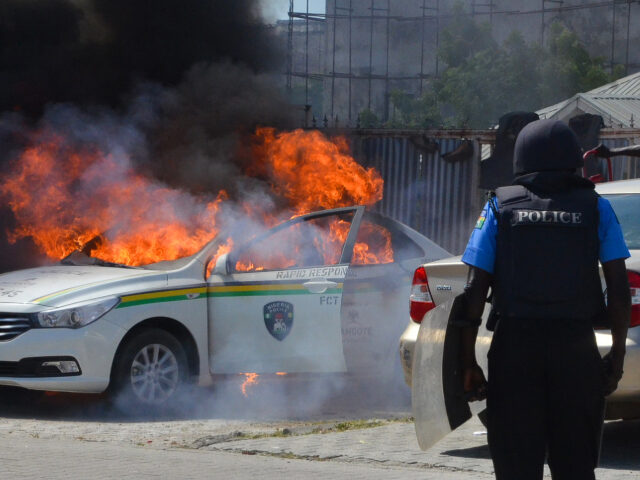Nigerian Shiite militants with close ties to the government of Iran allegedly killed at least two police officers in the capital city of Abuja on Sunday.
Three more Nigerian police officers were “left unconscious in the hospital,” and three police cars were set on fire.
Abuja police said the “unprovoked attack” was the work of “the proscribed Islamic Movement of Nigeria (IMN).”
The IMN is a militant Shiite group that was launched in the 1980s by a Nigerian cleric named Ibrahim el Zakzaky, who said he was inspired to create a Shiite caliphate in Africa by the example of Iran’s 1979 Islamic revolution.
As recently as December 2023, Zakzaky declared fealty to Iranian Supreme Leader Ayatollah Ali Khamenei, describing him as the worldwide leader of the “Islamic Revolution.” IMN members swear allegiance to the ayatollah of Iran before they swear loyalty to their local leaders. Khamenei, in turn, said the IMN has the full support of the Iranian government.
About half of Nigeria’s population is Muslim, but most people are Sunni Muslims. The IMN is highly organized and capable of whipping up massive demonstrations even though Shiites are a minority in Nigeria. It is the largest Shiite group in Nigeria, although not all Nigerian Shiites belong to it.
The IMN includes both political and militant wings. Some of its less radical members hold government and police jobs. Others advocate for violent revolution, and some of their demonstrations have been highly destructive. The IMN operates more than 360 primary and secondary schools across Nigeria.
Zakzaky, his wife, and about two hundred of their followers were arrested during a government crackdown on the IMN in 2015.
The Nigerian military accused the IMN of attempting to assassinate army chief Lt. Gen. Tukur Buratai in 2015 in an attack that involved hundreds of people throwing down roadblocks to halt Buratai’s convoy while gunmen opened fire. The IMN accused the army of wantonly attacking its headquarters and killing at least six people.
This led to massive protests, which the government cited as a reason for banning the IMN entirely in July 2019, when a court ruled the group was guilty of “acts of terrorism and illegality.” Several police officers were killed in the protests that prompted the ban.
Some human rights groups were uncomfortable with the crackdown, arguing that the total ban on the IMN infringed upon the religious freedom of Nigerians.
Zakzaky and his wife were released from police custody by court order in July 2021, an event his supporters welcomed as a “victory for truth and justice against tyranny and impunity.”
Police in Abuja did not provide many details about the attack on Sunday, beyond describing it as “unprovoked,” blaming it on the IMN, and reassuring the public that the “situation is under control.”
“The proscribed organization attacked the police checkpoint unprovoked, wielding machetes, improvised explosive devices, and knives,” a police spokeswoman said on Sunday.
The IMN issued a statement on Sunday accusing the police of attacking a Shiite religious ceremony called the Arbaeen Symbolic Trek, essentially an alternative to the traditional hajj pilgrimage to Mecca in Saudi Arabia, which Nigerian Shiites say they have difficulty attending.
Local media reported “pandemonium” in the district of Wuse on Sunday, as Shiites clashed with police during the Arbaeen Symbolic Trek. According to these reports, the police set up checkpoints that interfered with the Shiite religious ceremony, and an angry crowd attacked one of those checkpoints, resulting in the fatalities that the government announced.

COMMENTS
Please let us know if you're having issues with commenting.